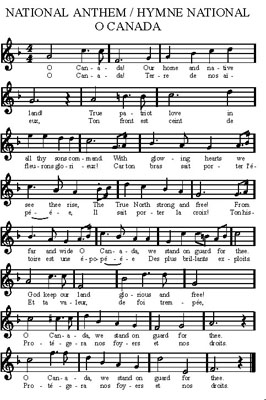Browse "Music"
-
Article
Les Petits chanteurs de Granby
Les Petits chanteurs de Granby. Choir school of about 100 children's and men's voices. It was founded in 1931 in Granby (60 km east of Montreal) by Brother Julien Hamelin of the Frères du Sacré-Coeur. The ensemble enjoyed the official patronage of the city.
"https://development.thecanadianencyclopedia.ca/images/tce_placeholder.jpg?v=e9dca980c9bdb3aa11e832e7ea94f5d9" // resources/views/front/categories/view.blade.php
https://development.thecanadianencyclopedia.ca/images/tce_placeholder.jpg?v=e9dca980c9bdb3aa11e832e7ea94f5d9
-
Article
Les Petits chanteurs de Trois-Rivières
Les Petits chanteurs de Trois-Rivières. Boys' choir, to which a few men's voices are added, founded in 1947 by J.-P. Quinty and J. Dugré, two Rover Scouts of the Comtois clan of Trois-Rivières.
"https://development.thecanadianencyclopedia.ca/images/tce_placeholder.jpg?v=e9dca980c9bdb3aa11e832e7ea94f5d9" // resources/views/front/categories/view.blade.php
https://development.thecanadianencyclopedia.ca/images/tce_placeholder.jpg?v=e9dca980c9bdb3aa11e832e7ea94f5d9
-
Article
Les Petits chanteurs du Mont-Royal
Les Petits chanteurs du Mont-Royal. Choir and choir school which exists primarily to provide the musical portion of the religious ceremonies at Saint Joseph's Oratory on Mount Royal, Montreal.
"https://development.thecanadianencyclopedia.ca/images/tce_placeholder.jpg?v=e9dca980c9bdb3aa11e832e7ea94f5d9" // resources/views/front/categories/view.blade.php
https://development.thecanadianencyclopedia.ca/images/tce_placeholder.jpg?v=e9dca980c9bdb3aa11e832e7ea94f5d9
-
Article
Centennial Concert Hall
The Centennial Concert Hall is a performing arts centre located on Main Street in Winnipeg, Manitoba. It opened in in 1968 and is owned by the province and operated by the Manitoba Centennial Centre Corporation.
"https://d2ttikhf7xbzbs.cloudfront.net/centennialconcerthall/centennialconcerthall.jpg" // resources/views/front/categories/view.blade.php
https://d2ttikhf7xbzbs.cloudfront.net/centennialconcerthall/centennialconcerthall.jpg
-
Article
"Mon Pays"
Originally composed as a theme song for a film, Gilles Vigneault’s “Mon pays” expresses nationalism, solidarity and connection to the northern landscape, and was adopted as a Québécois anthem.
"https://d2ttikhf7xbzbs.cloudfront.net/media/media/af9e2a63-4657-4c20-a0e7-c72d675829cf.jpg" // resources/views/front/categories/view.blade.php
https://d2ttikhf7xbzbs.cloudfront.net/media/media/af9e2a63-4657-4c20-a0e7-c72d675829cf.jpg
-
Article
Acadian Music
Music and song have always been an important part of Acadian culture. Music education has existed in Acadia since the 1860s. School and college choirs have enjoyed great success, and classically trained Acadian musicians have distinguished themselves on the world stage.
"https://d2ttikhf7xbzbs.cloudfront.net/media/media/051052d9-c140-4d7a-9768-aa1d64cedeb3.jpg" // resources/views/front/categories/view.blade.php
https://d2ttikhf7xbzbs.cloudfront.net/media/media/051052d9-c140-4d7a-9768-aa1d64cedeb3.jpg
-
Article
Dutch Music in Canada
The first Dutch immigrants to Canada arrived via the USA during the late-18th and early-19th centuries as part of the United Empire Loyalist contingent. By 1867 there were 29,000 persons of Dutch origin; in 1986 there were more than 850,000, many of whom arrived soon after World War II.
"https://development.thecanadianencyclopedia.ca/images/tce_placeholder.jpg?v=e9dca980c9bdb3aa11e832e7ea94f5d9" // resources/views/front/categories/view.blade.php
https://development.thecanadianencyclopedia.ca/images/tce_placeholder.jpg?v=e9dca980c9bdb3aa11e832e7ea94f5d9
-
Article
“O Canada”
“O Canada” is Canada’s national anthem. Originally called “Chant national,” it was written in Québec City by Sir Adolphe-Basile Routhier (words in French) and composer Calixa Lavallée (music), and first performed there on 24 June 1880. It began to be sung widely in French Canada at that time and later spread across Canada in various English-language versions, of which the best-known was written by Robert Stanley Weir in 1908. The lyrics of this version were amended several times over the years, with the most recent changes occurring in February 2018; the French lyrics have been shortened but otherwise remain unaltered from the original. “O Canada” was approved as Canada’s national anthem by a Special Joint Committee of the Senate and House of Commons on 15 March 1967. It was officially adopted as Canada’s national anthem under the National Anthem Act on 27 June 1980. The Act was proclaimed by Governor General Edward Schreyer in a public ceremony on Parliament Hill on 1 July 1980.
"https://d2ttikhf7xbzbs.cloudfront.net/media/media/b82d1c6f-e0dd-4fbe-ba40-5e1b7e2b35dd.jpg" // resources/views/front/categories/view.blade.php
https://d2ttikhf7xbzbs.cloudfront.net/media/media/b82d1c6f-e0dd-4fbe-ba40-5e1b7e2b35dd.jpg
-
Article
Filipino Music in Canada
In the 1986 Census of Canada, 107,000 listed Filipino as their single or multiple ethnic origin. Of these, 27,000 were born in Canada and 80,000 had immigrated: 31,000 in the period 1978-86, 45,000 in the period 1967-77, and the rest before 1967.
"https://development.thecanadianencyclopedia.ca/images/tce_placeholder.jpg?v=e9dca980c9bdb3aa11e832e7ea94f5d9" // resources/views/front/categories/view.blade.php
https://development.thecanadianencyclopedia.ca/images/tce_placeholder.jpg?v=e9dca980c9bdb3aa11e832e7ea94f5d9
-
Article
Police Bands in Canada
The first band affiliated with the North-West Mounted Police was formed in 1876. During the next 30 years, the force had about seven bands. An official RCMP band was formed in 1938 and first performed in 1939, including at the royal visit by King George VI and Queen Elizabeth. Other RCMP bands were also active throughout the 1950s and particularly during Canada’s centennial celebrations in 1967. The RCMP band disbanded in 1994.
"https://d2ttikhf7xbzbs.cloudfront.net/Edmonton-Police-08412.jpg" // resources/views/front/categories/view.blade.php
https://d2ttikhf7xbzbs.cloudfront.net/Edmonton-Police-08412.jpg
-
Article
"Alouette!"
"Alouette!" The most popular Canadian folksong. It also has become a symbol of French Canada for the world, an unofficial national song identifiable from the first few measures of its lively chorus in 2/4 time. Marius Barbeau is of the opinion that "Alouette" originated in France, but James J. Fuld, in The Book of World-Famous Music (New York 1966), points out that the first written version, "Alouetté," appeared in A Pocket Song Book for the Use of Students and Graduates of McGill College (Montreal 1879). The song was published later as "Alouette" in the McGill College Song Book (Montreal 1885). The first known printed version in France dates from 1893: it appeared in Julien Tiersot's Revue des traditions populaires, vol 8 (Paris). The words and music are found in many anthologies and collections in Canada, the USA, and even Europe, notably in William Parker Greenough's Canadian Folk-life and Folk-lore (New York 1897). Several versions exist in Canada. Marius Barbeau summarizes the different texts in a work appropriately named Alouette (Montreal 1946). However, in all versions of the song, with its enumerations and frequent recapitulations, the idea remains the same: the lark's feathers are plucked from its head, wings, back, tail, and so on.
"https://development.thecanadianencyclopedia.ca/images/tce_placeholder.jpg?v=e9dca980c9bdb3aa11e832e7ea94f5d9" // resources/views/front/categories/view.blade.php
https://development.thecanadianencyclopedia.ca/images/tce_placeholder.jpg?v=e9dca980c9bdb3aa11e832e7ea94f5d9
-
Article
"Bluebird on Your Windowsill"
"Bluebird on Your Windowsill." Pop song by the Vancouver nurse (Carmen) Elizabeth Clarke (b Winnipeg 1911, d Vancouver 1960). The words (1947) were inspired by a small bird which perched on a windowsill of Vancouver's Hospital for Sick and Crippled Children. The melody was added later.
"https://development.thecanadianencyclopedia.ca/images/tce_placeholder.jpg?v=e9dca980c9bdb3aa11e832e7ea94f5d9" // resources/views/front/categories/view.blade.php
https://development.thecanadianencyclopedia.ca/images/tce_placeholder.jpg?v=e9dca980c9bdb3aa11e832e7ea94f5d9
-
Article
"Canadian Idol"
"Canadian Idol." Reality television show, based on the British singing competition television show "Pop Idol" (2001- ), created by the UK's FremantleMedia and 19 TV, and produced by Canada's Insight Productions.
"https://development.thecanadianencyclopedia.ca/images/tce_placeholder.jpg?v=e9dca980c9bdb3aa11e832e7ea94f5d9" // resources/views/front/categories/view.blade.php
https://development.thecanadianencyclopedia.ca/images/tce_placeholder.jpg?v=e9dca980c9bdb3aa11e832e7ea94f5d9
-
Article
"Early Morning Rain"
"Early Morning Rain." Song by Gordon Lightfoot. Written in the summer of 1964, it recounts a lonely man's attempts to make his way back to a faraway home.
"https://development.thecanadianencyclopedia.ca/images/tce_placeholder.jpg?v=e9dca980c9bdb3aa11e832e7ea94f5d9" // resources/views/front/categories/view.blade.php
https://development.thecanadianencyclopedia.ca/images/tce_placeholder.jpg?v=e9dca980c9bdb3aa11e832e7ea94f5d9
-
Article
"If You Could Read My Mind"
"If You Could Read My Mind." Song by Gordon Lightfoot. Written in 1969, "catches the cadences of a hurt lover unused to words that cut too close" (Maclean's, 1 May 1978). The song has been recorded more than 100 times, first in 1969 by the composer for his LP Sit Down Young Stranger.
"https://development.thecanadianencyclopedia.ca/images/tce_placeholder.jpg?v=e9dca980c9bdb3aa11e832e7ea94f5d9" // resources/views/front/categories/view.blade.php
https://development.thecanadianencyclopedia.ca/images/tce_placeholder.jpg?v=e9dca980c9bdb3aa11e832e7ea94f5d9
